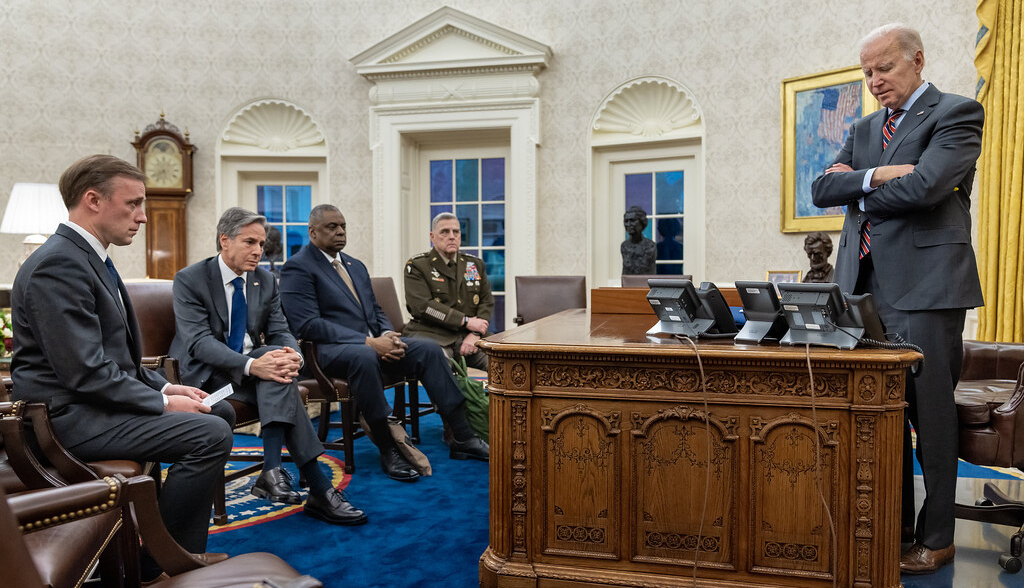America’s Ally Problem

Published by The Lawfare Institute
in Cooperation With

Editor’s Note: Why don’t small, seemingly vulnerable allies listen to the United States when it makes demands on them? Jeremy Shapiro of the European Council on Foreign Relations tries to explain this puzzle, arguing that effective lobbying, the U.S. desire for leadership, and the U.S. focus on credibility all create opportunities for weaker powers to ignore U.S. wishes while preserving U.S. support. A version of this article was previously published on Blue Blaze.
Daniel Byman
***
“Who the fuck does he think he is? Who is the fucking superpower here?” President Bill Clinton famously blasphemed in 1996. More than 25 years later, Clinton is a retired vegan recovering from heart problems who occasionally comments on politics while studiously avoiding references to Jeffrey Epstein. The guy who couldn’t identify the superpower, Benjamin Netanyahu, is still the prime minister of Israel and is now inspiring his fifth U.S. president to fits of obscenities.
So, it is perhaps worth asking whether Netanyahu or Clinton had the better grasp of the U.S.-Israeli relationship. Clinton had a certain point, of course: America has the world’s largest economy, an unparalleled military, and a secure continental homeland. Israel is a tiny little strip of land, precariously perched on the western edge of the most volatile region on Earth and surrounded by people who hate it. With few friends in the world beyond America, Israel is highly dependent on its U.S. partner.
In theory, these bald facts would seem to give the United States a lot of leverage in the relationship. In practice, it seems Israel has most of the control. The U.S. president and secretary of state have been screaming from the rooftops for several months to get Israel to agree to a ceasefire in Gaza. Netanyahu has basically ignored them and seems to have paid little price in terms of U.S. military assistance or political support. The Biden administration announced in early May that it would stop sending certain types of weapons to Israel but then just a week later announced it was moving forward with a further $1 billion aid package.
This upside-down influence is to varying degrees present in many other U.S. partnerships, including the U.S. relationship with Ukraine. It stems from a mutually reinforcing blend of allied influence in U.S. politics and U.S. domestic pathologies about international leadership and credibility. Given the state of the world today, it is perhaps time to rethink this traditional American policy of allied indulgence.
Friends Like These
Israel is only the starkest example of a widespread phenomenon in U.S. foreign policy. Very dependent U.S. allies, from Saudi Arabia to Ukraine to Taiwan, often refuse to listen to the U.S. government’s demands and sometimes publicly defy the U.S. president. It is hard to imagine Belarusian President Alexander Lukashenko doing that to Vladimir Putin.
In general, America’s allies around the world have a strong influence on U.S. policy choices. They have been able to inspire enormous contributions from America for their priorities, often in situations in which a more cold-hearted reading of U.S. interests would clearly point toward other policies. It is geopolitically odd, for example, that the United States has pledged to go to war with Russia, a massive nuclear power, if it attacks Latvia, a tiny country on Russia’s border that many would argue has no strategic relevance for America. It seems unlikely that famed strategists Metternich or Bismarck would approve. But the United States has dozens of such commitments around the world, many of them right on the borders of Russia and China.
This situation is so perplexing that the Russian leadership, for example, simply can’t believe that less powerful states like Ukraine could have such influence on U.S. policy. As Michael Kimmage and I noted in Foreign Affairs, “Russians cannot imagine that the leaders of countries such as Ukraine have minds of their own. For Moscow, Ukrainian hostility is simply the veiled extension of American hostility.” This would come as a big shock to leaders in Washington who have had constant reminders over the past two years that Ukrainians have minds of their own. The United States, for example, told Ukraine not to use U.S.-provided weapons to attack targets within the internationally recognized borders of Russia. But in May 2023 an unidentified force attacked the Russian city of Belgorod using U.S. armored vehicles. Washington seemed upset, but the weapons continued to flow.
In a certain way, the tragic war in Ukraine has evolved into a dispute over how much control Washington actually exercises over Kyiv. The Russian leadership looks at the material dependence that Ukraine has on the United States and assumes that the superpower must be in full control of Ukraine. They simply can’t imagine that a country would provide such critical assistance in materiel but not able to exercise their will at a whim.
From the Russian standpoint, U.S. control over Ukraine is an existential security threat. Russians view the United States as unremittingly hostile to Russia and believe that it would use Ukraine as a base from which to attack Russia or undermine its society. As the New York Times reported in February, the CIA has established a close relationship with the Ukrainian intelligence services and has established 12 cooperative bases within Ukraine from which they are launching covert operations into Russia. All of this, from the Russian perspective, would seem to be proof of U.S. control of Ukraine and its intent to use it against Russia.
But from the U.S. perspective, the American leadership looks at their daily experiences in dealing with their Ukrainian ally and knows the United States has no such control of Ukraine. From their perspective, their intelligence and military relationship with Ukraine is a normal give-and-take with an ally that has its own interests and perspectives. U.S. policymakers are thus confused about what the Russians find so worrying.
An American Problem
All of this raises the question of why America runs its foreign policy this way. It is a puzzle that has launched a thousand research agendas, but I would point to three fundamental reasons: domestic politics, the U.S. will to leadership, and the role of history and credibility.
One cause seems to be the peculiar nature of domestic politics of the United States. Even for a democracy, the U.S. system of governance provides a lot of access points to its politics, including for foreigners. Various U.S. allies and partners have developed deep contacts and influence in U.S. domestic politics through skillful use of diasporas, congressional lobbying, think tanks, propaganda, and of course money. The Israelis are the master of this technique—even as the war in Gaza inspires massive protests across America, Israel still enjoys overwhelming support in the U.S. Congress. An Israeli aid bill passed the Senate 79-18 in April, and it would have had more support if it hadn’t been tied to more controversial aid to Ukraine. In May, the House of Representatives passed a bill that condemned Biden’s ineffective toughness with Israel and sought to force him to send arms shipments to Israel. But of course, all allies play this game, and many of them are nearly as good at it as Israel.
One of the reasons these domestic political maneuvers often work is that they can play on a specifically American will for global leadership that exists at both the elite and popular levels. American elites see themselves as being in charge of “the free world,” and the best evidence for that is a web of strong, unified alliances and a collective approach to international problems. The American public may not be able to locate Ukraine on a map, but they do care that their president projects a sense of control and leadership in the world. The idea of weakness is anathema in U.S. politics. It is therefore important for U.S. leaders’ self-image and domestic standing that they smooth over disputes with allies. This is clearly less true for a president like Donald Trump, who defines strength to his constituents as his ability to exact a tough deal even from allies in the name of U.S. interests. But more traditional U.S. leaders, including Joe Biden, define their strength through their capacity to lead U.S. alliances and solve global problems.
The need to seem in control weakens U.S. bargaining with allies, who can get concessions simply by threatening to make a stink at a NATO summit. The U.S. will to leadership also means that the United States often takes ultimate responsibility for international security problems, even when it has no direct stake. The will to leadership has, for example, persuaded some U.S. policymakers that it is Washington’s responsibility to create peace between the Israelis and Palestinians, and they often seem more interested in resolving the conflict than the parties involved. In the current round of fighting, it has led to the odd spectacle of the United States essentially trying to bribe Saudi Arabia with binding security guarantees and a civilian nuclear program to open diplomatic relations with Israel. This U.S. need for a deal obviously weakens its negotiating leverage with its own allies.
Finally, the United States seems to feel that it must sustain allied commitments because it has them, even if the reasons for initially acquiring them are lost to the mists of time or no longer apply. The United States, for example, extended security guarantees to the Baltic states in 2004 largely because it never thought Russia would threaten these states and felt that NATO membership would help them secure their transition to democracy. Twenty years later, that commitment has much greater strategic import, but U.S. leaders insist that if they don’t honor all such commitments, no matter how strategically irrational, they would erode U.S. credibility and embolden U.S. adversaries everywhere. The U.S. alliance system is, in the parlance of the Pentagon, a self-licking ice cream cone. The credibility proposition is questionable: It is entirely normal that the United States or any country would have different levels of commitment to, say, Taiwan than it has toward Ukraine if there are different geopolitical stakes involved. But U.S. leaders deeply believe in credibility arguments, and so they also provide leverage for U.S. allies.
Whatever its causes, America’s ally problem was perhaps only of academic interest during the period of overwhelming American power. But in a period of greater geopolitical competition, it is not clear that the United States can any longer afford this policy of allied indulgence. Or put another way, it is not clear that anyone is really a fucking superpower anymore.





